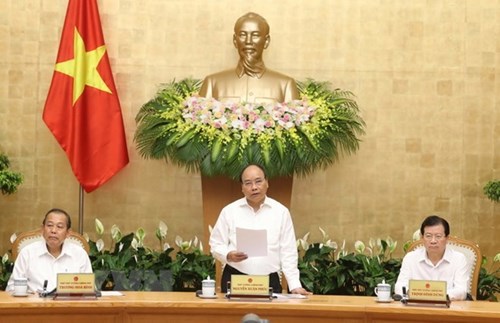He also directed adjusting education and health care fees in an appropriate time and managing credit for manufacturing and trade properly.
“It’s not easy to ensure the macro-economy is stable and the inflation rate is below 4 percent when the oil prices in the global market are soaring,” the PM stressed.
He warned some localities about being subjective in their management as it could make it hard for the efforts to rein in inflation.
    |
 |
|
Prime Minister Nguyen Xuan Phuc (middle) at the meeting |
Reviewing socio-economic performance in the first five months of this year, the PM lauded localities for striving to achieve economic growth.
According to him, the Purchasing Managers’ Index (PMI) of Vietnam was up 53.9 point in May, the highest in ASEAN. The total rice production increased by 1.1 million tons during the winter-spring crop, fueling rice export and bringing higher income to farmers.
Animal husbandry and aquatic production were growing while new progresses were seen in new rural development.
Industrial production rose by 9.7 percent during the period, with manufacturing and processing up 11 percent.
The total retail and consumer goods revenue hiked 10.1 percent. The total foreign arrivals in Vietnam was estimated at 6.7 million, up 27.6 percent year-on-year. Five-month exports surged 15.8 percent to USD 93.1 billion while trade surplus reached USD 3.4 billion. Foreign direct investment disbursement stood at USD 6.75 billion, marking a nearly 9 percent increase.
There were around 53,000 newly-established enterprises and the total newly-registered capital neared VND 1.3 quadrillion.
However, public investment disbursement was nearly 29 percent of the set target, not only in ministries, agencies but also in the capital city Hanoi and the southern metropolis Ho Chi Minh City, resulting in delayed construction and higher costs.
The PM requested continuing to attract domestic and foreign investment, and further raise industrial production index, especially in manufacturing and processing.
Though agricultural production prospered, cross-border trade in farm produce remains high. Moreover, forest exploitation and illegal logging still occurred in the Central Highlands provinces of Dak Lak, Dak Nong and the northern province of Bac Kan.
Management of lakes, dykes to brace for the rainy season, and traffic safety, especially in railways, remain complicated, he admitted.
In administrative reform, he urged creating a better business environment to achieve the goal of having 1 million businesses by 2020.
Ministries and agencies were asked to review the first-half socio-economic and environment performance so as to fulfill this year’s assigned tasks.
On the occasion, he also assigned government members to make thorough reports in preparation for question-and-answer sessions during the ongoing fifth session of the 14th National Assembly.
Source: VNA